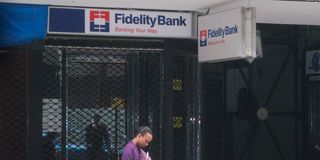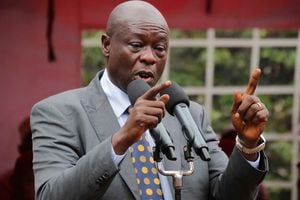Fidelity Bank shareholders dig in for cancelling of SBM deal, cite coercion

Fidelity Bank on Nairobi’s Kaunda Street.
It started sometimes in October 2015 following collapse of Imperial Bank Ltd.
The following year, sector regulator Central Bank of Kenya (CBK) shut yet another lender- Chase Bank, triggering a series of panic withdrawals in several lenders including Fidelity Commercial Bank Ltd.
Documents filed in court show that Fidelity was able to meet depositors’ withdrawal requests when IBL was shut, despite panic in the industry.
However, panic reactions among customers in several banks following close down of Chase Bank saw fresh withdrawals from Fidelity Bank bleeding it a large portion of its deposit base.
To save the situation, the bank approached CBK for liquidity support, as the lender of last resort and its mandate to support banks in a bid to stabilise the market.
However, the CBK allegedly instructed Fidelity to collateralise its support line and for the board to provide two properties worth Sh700 million to get the funding. Board members of Fidelity Bank thought this was unfair but pressed on with meetings with the regulator.
During one of the forums with CBK, the bank’s directors were handed a business card and directed to meet a representative of SBM Bank Holdings from Mauritius, who was spearheading the opening of the bank’s operation in Kenya.
There were subsequent meetings and directors of Fidelity were convinced to accept to sell the lender to SBM Bank Holdings.
In the course of negotiations, SBM allegedly considered Fidelity to be a small bank yet they were looking for a bigger bank. Then CBK governor Patrick Njoroge allegedly intervened and offered to sell Fidelity Bank to the Mauritians for $1.
During the talks for share purchase agreement Fidelity Bank shareholders allegedly refused to proceed with the transaction. It was then that CBK allegedly coerced them to sign the SPA.
In a dispute now to be decided in Kenya after the High Court rejected a bid for the matter to be handled through arbitration, shareholders of Fidelity Bank allege that Dr Njoroge forced the negotiations since there was an embargo on issuance of new licenses, which the regulator had imposed.
In a win for Fidelity Bank, Justice Alfred Mabeya also rejected a bid by CBK to disentangle itself from the case stating that there were claims of coercion and abuse of power, which the regulator has to disprove.
“Though the 2nd defendant (CBK) was not party to the SPA, it has been accused of influencing the final terms therein and abusing its statutory mandate in the process of the 1st defendant’s (SBM) acquisition of the FCBL,” the judge said.
The judge rejected a plea for the case to be settled through arbitration. “Fidelity through its largest shareholder Sultan Khimji had pleaded that their claim was not only based on breach of contract, or matters solely within the purview of the SPA, but there were claims of coercion, misrepresentation, fraud, breach of constitutional and statutory duty, unjust enrichment and restitution,” the judge said
The judge noted that shareholders were seeking orders that the heads of terms between the parties dated November 17, 2016 and the subsequent SPA be declared null and void and Fidelity be compensated for the full value as of December 2016 and general damages.
“The allegations indeed reveal a real dispute between the plaintiff and the defendants as it claims that there were deliberate misrepresentations knowingly made to coerce him to enter into a raw deal.
The Indian Ocean Island banker wanted the matter referred to arbitration arguing that a share purchase agreement (SPA) dated March 28, 2017 stipulated that disputes should first be settled through consultation and if it fails, it must be referred to arbitration.
SBM had argued that the SPA contained a valid and binding arbitral clause which provided that disputes arising from the agreement would be resolved by consultation and if the dispute is not resolved in 30 days, then any party could referee it to arbitration.
The bank maintained that the dispute with the shareholders squarely falls with the arbitration clause.
Mr Khimji says in the petition that CBK forced its directors to dispose of the bank for a song, under threats of criminal charges, regulatory sanctions and closure. The shareholders further want compensation of Sh2.5 billion plus damages.
He alleges that they were forced to accept a negative valuation of Fidelity, alleging that SBM inflated operational costs and provisions for bad loans.
Further, CBK allegedly protected the interest of SBM in the terms and failed to act when the Mauritius based lender negated one of the terms by failing to inject Sh1.4 billion into Fidelity Bank, he said.
“That CBK applied regulatory pressure in the negotiations and failed to exercise its mandate to ensure integrity, stability and soundness of banking institutions,” he said.
Justice Mabeya also granted orders stopping selling shares or ownership of SBM Bank Kenya, pending the determination of the case.
“The plaintiff (Mr Khimji) prays for judgment against the defendants (CBK and SBM), for a declaration that the share purchase agreement between the plaintiff and first defendant dated March 28, 2017, is invalid, null and void and of no legal effect and that the shareholders of the former Fidelity Bank are entitled to compensation for the full value of the said bank,” the suit papers say.
Alternatively, the shareholders want the court to compel SBM to comply with the share purchase agreement that set out $1 initial consideration, Sh600 million deferred payment, an additional Sh1.3 billion for undervaluation of the lender plus Sh600 million goodwill.
The judge directed the parties to appear before the High Court deputy registrar for pre-trial directions.





